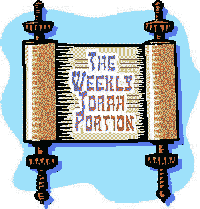Search our Archives:
» Home
» History
» Holidays
» Humor
» Places
» Thought
» Opinion & Society
» Writings
» Customs
» Misc.
|
Choosing Life
By Michael Chessen
Deuteronomy's alternate name, Mishne Torah (the repetition of the
Torah) seems to be applicable primarily because of its first three
readings. Over the course of these, Moses has reviewed the entire history
of the "generation of the desert". In doing so, however, he has not merely
"retold" previously recorded narratives, but the review's order, emphasis,
and of course Moses' added commentaries all serve to deepen our
understanding of all that has thus far transpired in the history of the
Jewish people.
Upon our having gained this deeper understanding and broader
perspective, the Torah can now in the reading of "Re'eh" ask us to make
what amounts to an "informed" choice. This choice is essentially what God
had already previously presented to Adam and Eve in the Garden of Eden.
While they had indeed been given the power of free will, primordial man and
woman had no problem whatsoever in obeying the word of God; they would have
as soon intentionally done otherwise as they would have bashed their heads
against a rock. Their "natural" understanding of "where their bread was
buttered" persisted until the serpent tricked them into partaking of the
forbidden fruit. Only after this were their eyes "opened" and they gained
an understanding of the concept of sin.
After having been able to "see" during the course of nearly all of the
Torah, the reading of Re'eh turns to us and asks us to carefully focus and
"choose life". For we now are capable of returning to Adam and Eve's choice
with their original sense of "natural" understanding(re-gained through our
Torah study); this "learned" understanding in turn "insulates" us and
protects us from being led astray.
Before turning to the teaching of laws and commandments, the Torah
here warns us against possibly becoming "serpents" against ourselves with
the famous exhortation to neither add to nor diminish from the
commandments. (Deut. 13:1) Just as the serpent diminished from Adam and
Eve's observance of the prohibition of eating from the fruit of the tree of
knowledge by adding that they were also not to touch it(and when the
addition proved superfluous the base commandment appeared also to be so),
individuals are liable to "weigh down" their "spiritual vehicles"(of Torah
observance) with "excess baggage", i.e., superfluous additions of
observance. This is a concept that can take many different forms of
expression. A modern instance of failing to "choose life" could be that of
a smoker who rationalizes that health risks from smoking can be disregarded
since there are studies citing health risks from countless sources. The
false reasoning here would be "if everything is unhealthy than nothing is".
The Torah helps us to gain the proper perspective and choose life
through its comprehensive prescription of the commandments. It seems only
proper that the reading of Re'eh concludes with the commandments involving
the three pilgrimage festivals. Leaving one's home three times a year in
order to bring offerings to the Holy Temple certainly immersed an
individual in "the great happiness involved in fulfilling a commandment".
May we soon come to again experience such joy.
Wishing you all a Shabbat Shalom !

|
|
Please let us know if you see something unsavory on the Google Ads and we will have them removed. Email us with the offensive URL (www.something.com)
|





|
